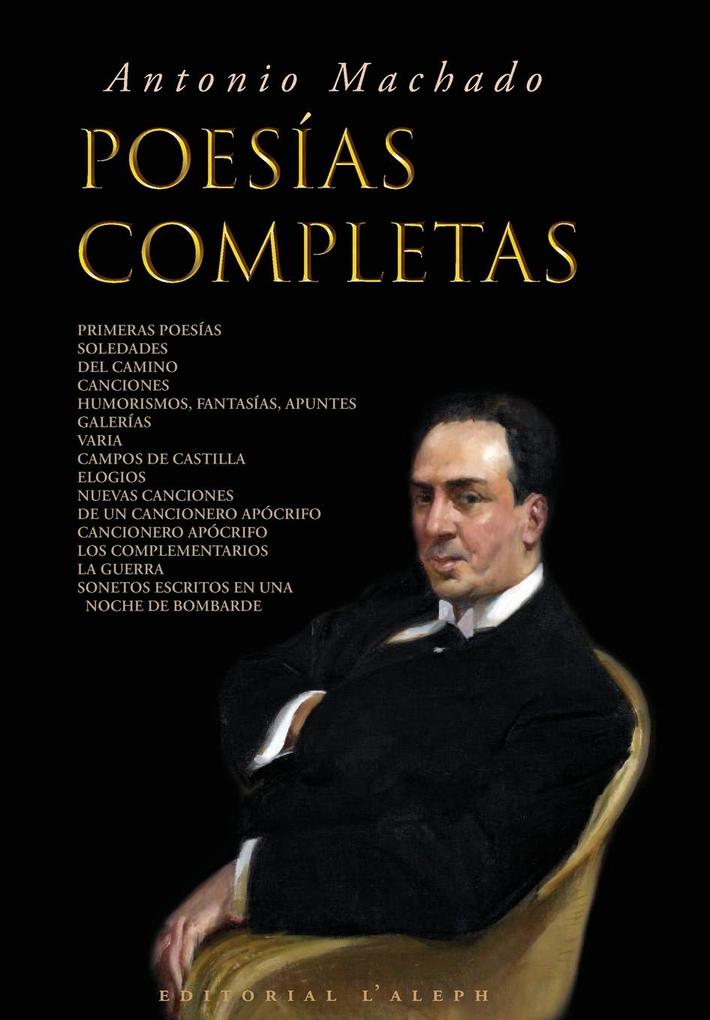
Zustellung: Mi, 08.01. - Sa, 11.01.25
Versand in 1-2 Wochen
VersandkostenfreiBestellen & in Filiale abholen:
Esta edición, a cargo de Sam Vaseghi, incluye los libros de poemas editados en vida de la autora.
Antonio Machado Ruiz (1875-1939) fue un poeta español, el más joven representante de la generación del 98. Su obra inicial, de corte modernista (como la de su hermano Manuel), evolucionó hacia un intimismo simbolista con rasgos románticos, que maduró en una poesía de compromiso humano, de una parte, y de contemplación casi taoísta de la existencia, por otra; una síntesis que en la voz de Machado se hace eco de la sabiduría popular más ancestral. Dicho en palabras de Gerardo Diego, hablaba en verso y vivía en poesía. Fue uno de los alumnos distinguidos de la Institución Libre de Enseñanza (ILE), con cuyos idearios estuvo siempre comprometido. Murió en el exilio en la agonía de la Segunda República Española.
ÍNDICE:
PRIMERAS POESÍAS
SOLEDADES
DEL CAMINO
CANCIONES
HUMORISMOS, FANTASÍAS, APUNTES
GALERÍAS
VARIA
CAMPOS DE CASTILLA
ELOGIOS
NUEVAS CANCIONES
DE UN CANCIONERO APÓCRIFO
CANCIONERO APÓCRIFO
LOS COMPLEMENTARIOS
LA GUERRA
SONETOS ESCRITOS EN UNA
NOCHE DE BOMBARDE
Antonio Machado Ruiz (1875-1939) fue un poeta español, el más joven representante de la generación del 98. Su obra inicial, de corte modernista (como la de su hermano Manuel), evolucionó hacia un intimismo simbolista con rasgos románticos, que maduró en una poesía de compromiso humano, de una parte, y de contemplación casi taoísta de la existencia, por otra; una síntesis que en la voz de Machado se hace eco de la sabiduría popular más ancestral. Dicho en palabras de Gerardo Diego, hablaba en verso y vivía en poesía. Fue uno de los alumnos distinguidos de la Institución Libre de Enseñanza (ILE), con cuyos idearios estuvo siempre comprometido. Murió en el exilio en la agonía de la Segunda República Española.
ÍNDICE:
PRIMERAS POESÍAS
SOLEDADES
DEL CAMINO
CANCIONES
HUMORISMOS, FANTASÍAS, APUNTES
GALERÍAS
VARIA
CAMPOS DE CASTILLA
ELOGIOS
NUEVAS CANCIONES
DE UN CANCIONERO APÓCRIFO
CANCIONERO APÓCRIFO
LOS COMPLEMENTARIOS
LA GUERRA
SONETOS ESCRITOS EN UNA
NOCHE DE BOMBARDE
Produktdetails
Erscheinungsdatum
29. September 2020
Sprache
spanisch
Seitenanzahl
342
Autor/Autorin
Antonio Machado
Verlag/Hersteller
Produktart
gebunden
Gewicht
723 g
Größe (L/B/H)
235/157/25 mm
Sonstiges
HC gerader Rücken mit Schutzumschlag
ISBN
9789176378748
Entdecken Sie mehr
Bewertungen
0 Bewertungen
Es wurden noch keine Bewertungen abgegeben. Schreiben Sie die erste Bewertung zu "Antonio Machado" und helfen Sie damit anderen bei der Kaufentscheidung.









